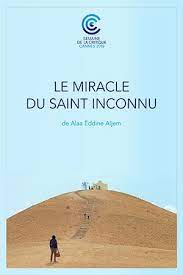
THE UNKNOWN SAINT/ LE MIRACLE DU SAINT INCONNU
Morocco, 2019, 100 minutes, Colour.
Younes Bouab, Salah Ben Saleh, Bouchaib Semmak, MahommedNouaimane, Anas el Baz, Hasan, Bdidah, Adelghani Kitab, Ahem Yarziz.
Directed by Alaa Eddine Aljem.
While the English title focuses on the unknown St and the shrine, the original French/Moroccan title focuses on the miracles that occur at the shrine and in the lives of the people in this desert village.
The camera takes full advantage of the desert landscapes of Morocco. It also immerses the audience in the remote village, streets, old buildings, interiors, the barbershop, and the shrine at the top of the hill.
The central focus of the screenplay is a thief, stranded in the middle of the desert, bearing the stolen money at the top of the hill. It is an arrest, jail, emerging after several years, returning and finding that a shrine has been built on the top of the hill and village has developed. He makes various attempts to recover the money, especially with the aid of an accomplice who is a strange mixture of stupidity, willingness to do violence, escaping when all seems lost.
The other characters in the village include the new doctor, bored with the lack of patience with any real illnesses, his long-time assistant, bored, who steals the clerk from the shrine. There is also the local barber who has a talent for making false teeth out of gold. Then there is a guard of the shrine, no duty, very severe on his son, but devoted to his dog. And there is the old farmer out in the desert who continues to dig the land despite no rain for 10 years, relying on his son.
There are some twists at the end of the film, especially the sun blowing up the shrine, discovering the money, building a shrine on the grave of his father.
Morocco’s submission for Oscar consideration in 2021.
- Moroccan submission for the Oscars? A film for Arab communities? Worldwide appeal?
- The title, the emphasis on the saint, miracles, shrines, pilgrimages? Issues of religious faith and prayer, expectations of miracles? Implications of superstitious belief?
- The desert settings, the vastness of the desert, the hill, the shrine, the village built up, the streets and buildings, the dispensary, the barbershop, the hotel, rooms? The drought fields, the hearts out in the countryside? The musical score?
- The dramatic aspects? The comic and ironic aspects? Portrait of the community, of individuals? The interlinking of the characters?
- The story of the thief, out in the desert, the hill, burying his bag, like a grave? The police, his imprisonment? Years passing, getting out? Returning to the village, shocked to find the shrine, the extended village? Staying at the hotel, the kindly man thinking he was a scientist? Phoning his collaborator? Mingling in the town? Going to the shrine? The guard and his dog? The attempts to recover the money, failure, his associate, suggestions for murder, running over the dog, having bad feelings, the return to the shrine, the three night pilgrimage? The final attempt? Hassan and the explosives, the blowing up of the shrine? The associate fleeing? The thief left wondering the desert?
- The guard, the dog, his harsh treatment of his son, profiting by the shrine, his successor during the day with the stall and drinks? His son and the animals, the accident with the dog? Taking him to the doctor, the issue of the teeth, the barber and his making gold teeth, stray dogs and models? The surgery on the dog’s mouth, success? And the doctor accepted into the community?
- The doctor, replacement, the nurse at the dispensary, longtime presence, the women and their perpetual illnesses, the same tablets? The men going to the shrine for miracles? The doctor and his being bored, discussions with the nurse, the drinking? The nurse, bored, stealing the plaque from the shrine? The decision to have their own miracle, the plaque, surrounded with straw, the symbolic design, the fire? The response of the people?
- Brahim, the old man, the drought, pride in his land, his reaction against the shrine, later going and attacking it? The pressure on his son, his son and the meals, the hard work? The neighbour, friendly, going to the village with his wife and daughter? The possibility of rain? The son, find his father dead, the ritual of the funeral? The rain? Taking the explosives, the scenes of the workers expanding the road? Going to the shrine, blowing it up? Finding the money, using the money to build his own shrine to his father? The pilgrims? The tourist taking photos?
- The barber, the clients, special creams, gossip, the men waiting? The making of the gold teeth?
- The range of pilgrims, the Fountain to put the money, prayer, pilgrimages?
- An entertaining blend of the dramatic and the comic, the Moroccan flavour?